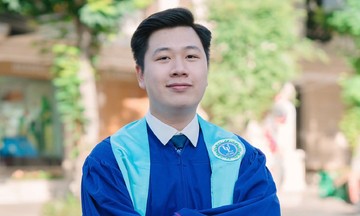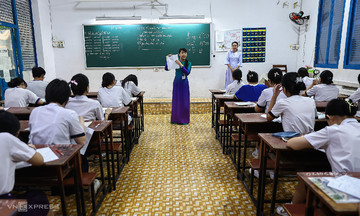The Hanoi Department of Education and Training announced 10th-grade entrance exam results and benchmarks last week. Successful candidates will enroll from July 10-12. Schools that haven't filled their quotas will meet on July 17 to finalize supplementary benchmarks.
Benchmarks for 115 high schools
Upon enrollment, students must choose 4 out of 9 elective subjects, in addition to 8 compulsory subjects (literature, math, foreign language 1, history, physical education, national defense and security education, experiential activities - career orientation, and local educational content).
The nine elective subjects include geography, economics and law, physics, chemistry, biology, technology, computer science, music, and fine arts.
Theoretically, students have 126 selection combinations, but in reality, each high school usually offers around 5-8 combinations, mainly divided into two groups: science and social sciences, depending on the number of teachers and facilities.
 |
Students taking the 10th-grade entrance exam in Hanoi in 2025. Photo: Tung Dinh |
The first thing students and parents need to note is the distinction between three concepts of subject combinations, according to Nguyen Cao Cuong, principal of Thai Thinh Secondary School.
- Study combination: Includes 4 of the 9 elective subjects mentioned above. Students will study this combination throughout high school. Changing combinations is only permitted at the end of each school year, which is almost synonymous with changing classes.
- High school graduation exam combination: From the 4 chosen elective subjects, students choose two for the high school graduation exam, called the elective subject combination, in addition to the two compulsory subjects, math and literature.
- University entrance exam combination: This combination includes three subjects used by universities for admissions, such as A00 (math, physics, chemistry), A01 (math, physics, English). The university entrance exam combination can be formed from 3 of the 4 graduation exam subjects or high school transcripts of the subjects.
Thus, choosing subjects upon entering 10th grade will affect both the high school graduation exam and university entrance exam combinations. Cuong believes students and parents need to carefully research and "choose correctly" from the start.
36 high school graduation exam combinations from 2025
The basis for choosing a study combination are the student's abilities, interests, and the field they wish to pursue at the university level. According to Cuong, students need to research which universities offer that field and what combinations they use for admissions.
"It's early to think about university orientation, but with the current interconnectedness and influence between combinations, students need to research more beforehand," Cuong said.
 |
10th-grade students and parents attend a subject combination guidance session at Viet Duc High School on July 7. Photo: School's Fanpage |
If students are unsure about their direction, Nguyen Boi Quynh, principal of Viet Duc High School, advises them to answer some questions: How will studying this subject affect the graduation exam, which combination can be used for university admissions, and so on.
"Students shouldn't choose randomly and aim for combinations solely of social science subjects," Quynh noted.
According to Quynh, students should try to study at least one science subject from physics, chemistry, or biology, to create common university entrance exam combinations when combined with the two compulsory subjects of literature and math, for example A01 (math, physics, English), B08 (math, biology, English), D07 (math, chemistry, English).
"Schools also need to be responsible for constructing study combinations that include 1 or 2 science subjects, while encouraging students to confidently register and not be afraid of science," Quynh said. "If they find it too challenging, they can still change, but not choosing any science subjects will make university admissions difficult."
This is also the view of the principal of an inner-city high school. He believes that choosing 10th-grade subject combinations is a crucial right that directly impacts the future. If still hesitant, students should choose combinations that provide more options for university admissions.
Thanh Hang












